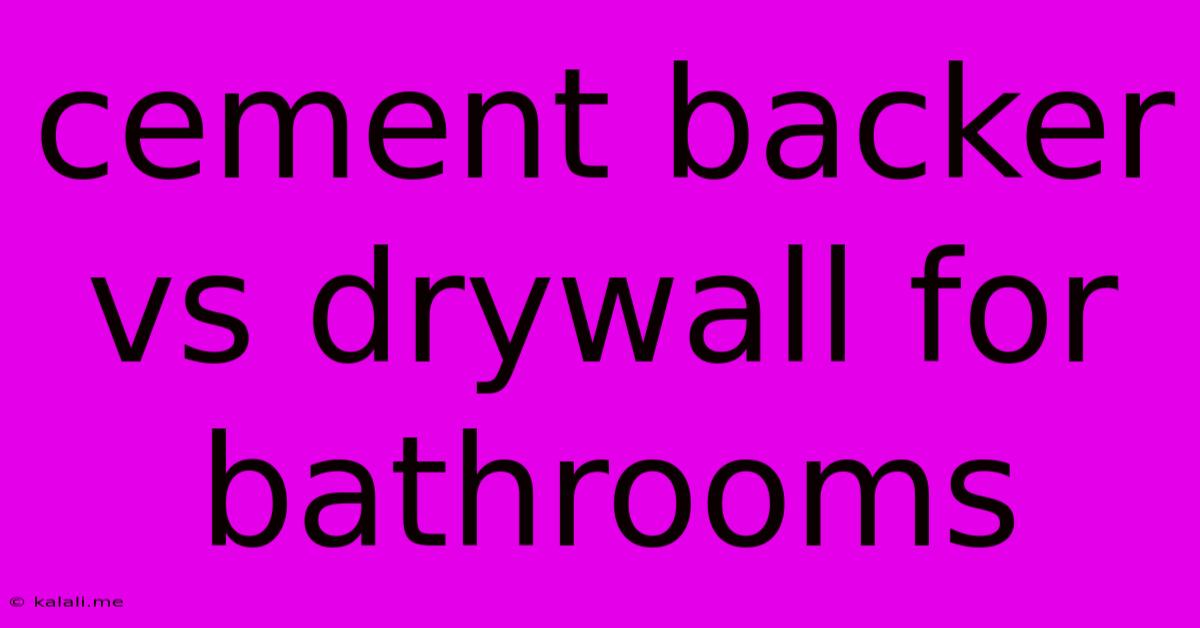Cement Backer Vs Drywall For Bathrooms
Kalali
May 24, 2025 · 3 min read

Table of Contents
Cement Backer Board vs. Drywall for Bathrooms: The Ultimate Showdown
Choosing the right substrate for your bathroom walls is crucial for longevity and preventing costly repairs down the line. This article will delve into the key differences between cement backer board (CBU) and drywall, helping you make an informed decision for your bathroom renovation project. We'll weigh the pros and cons of each, focusing on moisture resistance, durability, and ease of installation.
Keywords: Cement backer board, drywall, bathroom renovation, moisture resistance, water damage, tiling, installation, cost, durability, humidity.
Understanding the Materials
Both cement backer board and drywall are common wall coverings, but they differ significantly in their composition and properties.
-
Cement Backer Board (CBU): This is a rigid panel made from Portland cement, sand, and other additives. It's specifically designed to withstand moisture and provide a stable surface for tile installation. Common brands include Durock and WonderBoard.
-
Drywall (Gypsum Board): This is a widely used interior wall covering composed of gypsum plaster sandwiched between two layers of paper. It's lightweight and easy to work with, but it's significantly less resistant to moisture than CBU.
Cement Backer Board: The Pros and Cons
Pros:
- Superior Moisture Resistance: CBU is highly resistant to moisture and humidity, making it ideal for bathrooms and other wet areas. This resistance significantly reduces the risk of water damage and mold growth.
- Excellent Tile Substrate: Its rigid and stable surface provides a perfect base for installing tiles, preventing cracking and ensuring a long-lasting finish.
- Durable and Long-Lasting: CBU is robust and can withstand impacts and general wear and tear better than drywall.
- Reduces Risk of Mold: Its resistance to moisture helps prevent the growth of mold and mildew, promoting a healthier bathroom environment.
Cons:
- More Expensive: CBU is generally more expensive than drywall.
- Heavier and More Difficult to Install: Its weight and rigidity can make it more challenging to install compared to drywall, potentially requiring more time and expertise.
- Requires More Specialized Tools: Cutting and installing CBU often necessitates specific tools like a wet saw, potentially adding to the overall cost.
- Can Be Brittle: While durable, CBU can be brittle and prone to chipping if not handled carefully.
Drywall: The Pros and Cons
Pros:
- Cost-Effective: Drywall is significantly cheaper than CBU.
- Lightweight and Easy to Install: It's much easier to handle and install, requiring less specialized tools and expertise.
- Smooth Surface: Provides a smooth surface for painting, although not ideal for tiling.
Cons:
- Poor Moisture Resistance: Drywall is highly susceptible to moisture damage, leading to swelling, warping, and mold growth in humid environments like bathrooms.
- Not Suitable for Tiling: Drywall is not a suitable substrate for tiling as it lacks the strength and stability needed to prevent cracking and tile failure. This ultimately leads to costly repairs and replacements.
- Shorter Lifespan: Its susceptibility to moisture significantly reduces its lifespan in a bathroom setting.
The Verdict: Cement Backer Board Wins for Bathrooms
While drywall offers a cheaper and easier installation process, its susceptibility to moisture makes it a poor choice for bathrooms. The long-term cost savings and reduced risk of significant water damage from using cement backer board far outweigh the initial higher expense and increased installation difficulty. For bathroom walls, cement backer board is the clear winner for its superior moisture resistance, durability, and suitability for tiling. Investing in CBU will protect your investment and provide a safer, more long-lasting result. Consider the potential for mold growth and the cost of future repairs when making your decision. The peace of mind knowing your bathroom walls are protected against water damage is invaluable.
Latest Posts
Latest Posts
-
Doneness Stage Meaning Firm To The Bite
May 24, 2025
-
How To Get Mold Out Of Carpet
May 24, 2025
-
What Is The Square Root Of 25
May 24, 2025
-
How To Get Rid Of Mold In Bathroom
May 24, 2025
-
What Is Incomplete Dominance In Biology
May 24, 2025
Related Post
Thank you for visiting our website which covers about Cement Backer Vs Drywall For Bathrooms . We hope the information provided has been useful to you. Feel free to contact us if you have any questions or need further assistance. See you next time and don't miss to bookmark.